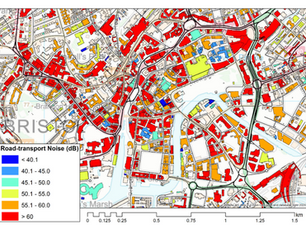top of page


Ethics and presymptomatic screening: Focus group study
Title Presymptomatic Screening for Risks to Children’s Mental Health: Ethical Considerations from a European Focus Group Study with Mental Health Professionals Source Sammie N. G. Jansen; Bob C. Mulder; Sandra Boekhold (2025). Bioethical Inquiry https://doi.org/10.1007/s11673-025-10473-0 Level of evidence Direct/qualitative research evidence What Six focus group discussions on potential risks and benefits of presymptomatic screening, involving 34 and adolescent mental health
-
2 days ago2 min read


Innovative noise modelling
Source D3.4 Innovative noise modelling, Gulliver et al, 2024 https://zenodo.org/records/16313125 Level of evidence Suggestive evidence What Report on implementation of the CNOSSOS noise prediction methodology for modelling of road‐transport noise within the Equal‐Life project, including a description of how to generate data for open modelling, specifically : · An overview of the metrics and data required for open‐source applications (i.e. harmonised between countries),
-
Jan 211 min read


Preschool studies mental health and cognition
Title Preschool studies mental health and cognition Source Equal-Life Deliverable 1.3: In-depth studies (2024) Kerstin Persson Waye , Maria Klatte, Natalia Vincens, Dirk Schreckenberg, Dick Botteldooren, Peter Lercher, Angel Dzhambov Jan Spilski, Larissa Leist, Yun Chen, Sarah Benz and the Equal-Life scientific team. Level of evidence Direct Where Germany (2x) and Belgium (1x) Who 111 for german and 60 for Belgium. 5-7 year old children Approach The preschool study aimed to
-
Jan 163 min read


Sleep as a potential link between exposome, mental health and cognitive development in children and adolescents.
Title Sleep as a potential link between exposome, mental health and cognitive development in children and adolescents. Source A literature review. Natalia Vincens, Kerstin Perss (in preparation) LERCHER, Peter; DZHAMBOV, Angel M.; WAYE, Kerstin Persson. Environmental perceptions, self-regulation, and coping with noise mediate the associations between children’s physical environment and sleep and mental health problems. Environmental Research, 2025, 264: 120414. Level of ev
-
Jan 151 min read


New metrics for outdoor and indoor noise exposure related to mental health
Title New metrics for outdoor and indoor noise exposure related to mental health Add zenodo link Source D3.6; New Noise metrics for mental health Dick Botteldooren et al. 2024, Arnaud Can, Dick Botteldooren, Timothy Van Renterghem, Peter Lercher, Rik Bogers (2025) Towards Valid, Transparent and Applicable Noise Indicators for Assessing Early-Life Mental Health Impacts , in preparation Dick Botteldooren, Lucas Fourneau, Colin Vergaerde, Valentin Le Bescond, Luc Dekoninck,
-
Jan 152 min read


Outdoor-to-indoor sound propagation models for noise exposure studies. New metrics for outdoor and indoor noise exposure related to mental health
Level of evidence Suggestive evidence, literature reviews, evidence based on theory and linked conceptual models. Approach Propagation models are based on measurements at 49 locations in the UK (dwellings) in Greater London and one location in Eindhoven. Findings Most studies on noise exposure and health outcomes use outdoor noise levels (derived from noise maps), rather than indoor levels, where children spend most of their time. We developed sound propagation models f
-
Jan 152 min read


Identification of exposome clusters
Title Identification of exposome clusters based on societal, social, built and natural environment – results of the ABCD cohort study Source Telkmann K, Gudi-Mindermann H, Bogers R, Ahrens J, Tönnies J, van Kamp I, Vrijkotte T, Bolte G. Environment International 2025. https://doi.org/10.1016/j.envint.2025.109335 What Exploratory exposome cluster identification based on 60 variables from the Social Exposome conceptual framework (enabling a holistic assessment of societal, so
-
Jan 151 min read


The role of self-regulation in the effects of environmental exposures on child mental health and cognition
Title The role of self-regulation in the effects of environmental exposures on child mental health and cognition Source Klatte, M.; Bergström, K.; Leist, L.; Jeram, S. ; Lachmann, T.; Spilski, J.; Arat, A.; White, K.; Schreckenberg, D.; van Kamp, I.; Dzhambov, A.; Lercher, P.; Vincens, N.; Jansen, S.; Julvez, J.; Persson Waye, K. (Submitted to Developmental Science, under review) Level of evidence Literature review What Systematic literature review on self-regulation (SR) as
-
Jan 151 min read


Protective effect of restorative possibilities
Title Protective effect of restorative possibilities including the role of physical activity on cognitive function and mental health in children and adolescents Source Dzhambov, Angel M.; Lercher, Peter; Van Kamp, Irene. Protective effect of restorative possibilities on cognitive function and mental health in children and adolescents: A scoping review including the role of physical activity Environmental Research 00139351, doi:10.1016/j.envres.2023.116452 Level of evidence L
-
Jan 151 min read


A new framework to consider equity in urban intervention planning
A logic framework to consider equity in urban intervention planning, implementation and evaluation Title A new framework to consider equity in urban intervention planning, implementation, and evaluation: development and application in a case study on an urban play spaces policy Source Ahrens J, White M, Jeram S, Ristovka G, Koning J, Gudi-Mindermann H, Tönnies J, Czwikla G, Weber M, Bolte G. A new framework to consider equity in urban intervention planning, implementation,
-
Jan 142 min read


A new conceptual framework of the Social Exposome
Title Integrating the social environment with an equity perspective into the exposome paradigm: A new conceptual framework of the Social Exposome Sources Gudi-Mindermann H, White M, Roczen J, Riedel N, Dreger S, Bolte G. Environ Res. Level of evidence Systematic scoping literature review and development of a theory-based conceptual model What Concepts and frameworks on social and psychosocial environment, theory-based concepts of social influences relevant for health and me
-
Jan 143 min read


Stress as a potential mediator
Title Stress as a potential mediator in the association between exposome and mental health and cognitive development in children and adolescents. Source Christin Belke, Dirk Schreckenberg, Sarah Benz, Julia Kuhlmann, Angel Dzhambov, Peter Lercher, Maria Klatte, Larissa Leist, Natalie Vincens, Kerstin Persson Waye, Sonja Jeram, Gordana Ristovska, Igor Spiroski, Katja Kanninen, Arto Alatalo, Jenny Selander, Charlotta Eriksson, Arzu Arat, Kim White, Irene van Kamp. (S ubmitted,
-
Jan 141 min read


Equal-Life conceptual models
Title Equal-Life conceptual models Source(s) Adopting a child perspective for exposome research on mental health and cognitive development - conceptualisation and opportunities. Kerstin Persson Waye, Jesper Löve, Peter Lercher, Angel M. Dzhambov, Maria Klatte, Dirk Schreckenberg, Christin Belke, Larisa Leist, Gordana Ristovska, Sonja Jeram, Katja M. Kanninen, Jenny Selander, Arzu Arat, Thomas Lachmann, Charlotte Clark, Dick Botteldooren, Kim White, Jordi Julvez, Maria Foras
-
Jan 132 min read


Innovative noise modelling
This tool implements an open-source road-transport noise modelling approach based on the CNOSSOS-EU methodology. The model estimates residential noise exposure using harmonised spatial datasets and is designed to be applicable across different geographical contexts within the Equal-Life project. It focuses on modelling noise exposure at building façades, including maximum, minimum, and variability of exposure around dwellings. Purpose of the tool: The purpose of the tool is t
-
Jan 71 min read


From evidence to action: using the Equal-Life Toolbox through training
Why training matters for stakeholders Improving children’s mental health and cognitive development requires more than access to scientific results. It requires shared understanding , practical tools , and the capacity to apply them in real-world contexts . Within the Equal-Life project, training activities were designed as a key mechanism to bridge research and practice, supporting stakeholders in translating exposome knowledge into policy design, planning decisions, and inte
-
Dec 23, 20253 min read


Ethics and early detection of disease risk factors
Source Sammie N.G. Jansen*, Bart A. Kamphorst, Bob C. Mulder, Irene van Kamp, Sandra Boekhold, Peter Van den Hazel, Marcel F. Verweij (2024) Journal BMC Medical Ethics, Volume25 https://doi.org/10.1186/s12910-024-01012-4 Level of evidence Review What Scoping review to identify ethical considerations around early detection of disease risk factors, covering articles published in Europe, USA, Canada and Australia in the Scopus, Embase, Philosopher’s Index databases. Findings We
-
Dec 16, 20252 min read


Exposure Explorer – Interactive Learning Dashboard
Exposure Explorer is an interactive web dashboard designed to support training and capacity-building activities on Equal-Life indicators and urban exposure concepts
-
Dec 8, 20252 min read


Interactive Web Dashboard for Urban Exposure Learning
The Urban Exposure dashboard supports training and capacity-building activities
-
Dec 7, 20252 min read


Pooled SEM Analysis Across Cohorts
R code for SEM analysis
-
Nov 19, 20253 min read


The Glossary
Too many words? use the glossary to clarify concepts and look up definitions
-
Nov 17, 20251 min read
bottom of page
_edited.jpg)